A diagnosis of IBD in dogs may leave you with many questions about what this means for your canine companion. Integrative veterinarian Dr. Julie Buzby is here to help. Learn what IBD is, symptoms of IBD in dogs, diagnosis, treatment, and prognosis. Plus, get a summary of a related condition with similar symptoms—a type of cancer called GI lymphoma in dogs.
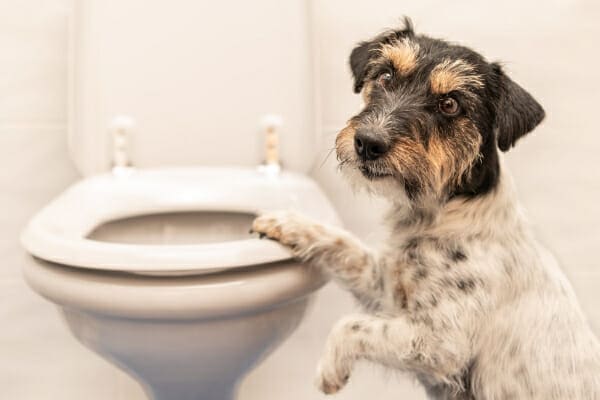
Diarrhea is something we don’t want to talk about, but it’s a very common problem in our dogs. Most of the time, diarrhea is minor and self-limiting—it gets better on its own after a day or two with little or no treatment. However, sometimes it can be an indication of a bigger problem.
Diarrhea has an almost infinite list of possible causes, ranging from “dietary indiscretion” (Fido ate something he shouldn’t have and is paying for it) to more serious causes, such as inflammatory bowel disease (IBD).
What is IBD in dogs?
As the name implies, dogs with IBD (inflammatory bowel disease) suffer from inflammation of the intestinal tract. Affected dogs’ intestines will show microscopic evidence of inflammation, and they may also have visibly thickened intestinal walls (seen on ultrasound or during abdominal surgery).
Dog IBD flare-ups can cause severe chronic diarrhea, inappetence (lack of appetite), weight loss, and other signs of GI discomfort.
IBD vs IBS
It’s important to distinguish IBD (inflammatory bowel disease) from IBS (irritable bowel syndrome). IBS occurs when a dog becomes stressed and develops colitis (i.e. inflammation of the colon). It can also be referred to as “stress colitis.”
For example, this happens to my dog when I board him at the dog kennel or take him to the groomer. Other dogs may experience an IBS episode after company comes to visit, they move to a new house, or experience a scary event (i.e. dogs and fireworks or thunderstorms.)
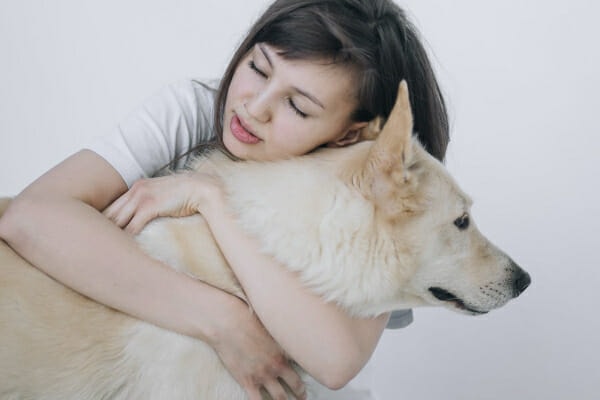
Also, in contrast to IBD, dogs with IBS have no detectable changes to the appearance of the intestinal tract. Check out Veterinary Partner’s article, Irritable Bowel Syndrome (IBS) in Dogs, to learn more.
What are the symptoms of IBD in dogs?
The hallmark sign of IBD in dogs is chronic diarrhea. Diarrhea is considered chronic if it lasts three weeks or more.
However, dog IBD flare-up symptoms may extend beyond diarrhea. Clinical signs of IBD in dogs depend on the segment of bowel affected and the severity.

If the small intestine is affected, your dog may show these symptoms:
- Have a decreased appetite
- Lose weight
- Vomit
- Become a lethargic dog
If the large intestines are affected, your dog may exhibit these symptoms:
- Flatulence
- Abdominal pain
- Mucoid or bloody stool
Signs are often intermittent in mild cases of IBD. However, in more severe cases of IBD, gastrointestinal symptoms occur more frequently and become progressively worse with time.
Other symptoms to watch for in severe cases of IBD in dogs
- Poor hair coat—As inflammatory bowel disease progresses, your dog may develop a poor hair coat due to the GI tract’s inability to absorb essential nutrients.
- Dehydration—If your dog experiences significant loss of fluids through diarrhea and vomiting, it can lead to severe dehydration.
- Pot-bellied appearance—Some dogs with severe IBD may develop a condition called protein-losing enteropathy. This causes a significant loss of proteins through the gastrointestinal tract. Normally, blood proteins help keep fluid in the blood vessels. However, if the blood protein levels drop low enough, fluid will leak out of the blood vessels. This causes ascites (i.e. free fluid in the abdomen), pleural effusion (i.e. free fluid around the lungs), or peripheral edema (i.e. fluid in the tissues of the body). You may notice your dog has a pot-bellied appearance due to ascites or swollen legs from peripheral edema.
- Rapid breathing—If your dog develops a pleural effusion, as described in the point above, he or she may have trouble expanding the lungs, so you might observe that your dog is breathing fast.
What causes IBD in dogs?
The underlying cause of inflammatory bowel disease in dogs is not known. Current research indicates it may be due to a combination of:
- Environmental and dietary factors
- Changes to the immune system
- The type of bacteria within the GI tract
- Increased gut permeability, meaning antigens (i.e. molecules that trigger an immune response) from parasites, food, and bacteria that normally stay in the GI tract can cross into the blood. This can cause an inflammatory response from the immune system
Which dogs tend to get IBD?
Inflammatory bowel disease is a common disease in dogs of all ages but tends to be more severe in middle-aged to senior dogs. Yorkshire Terriers and other small breed dogs are more likely than other dogs to develop protein-losing enteropathy secondary to IBD.

How is IBD in dogs diagnosed?
Inflammation in the GI tract can occur from a number of factors, including intestinal parasites, fungal infections, and food hypersensitivities.
However, in the strictest sense of the word, inflammatory bowel disease occurs when there is significant inflammation in the intestines without an underlying cause. It is a “diagnosis of exclusion.” This means that for many patients, IBD cannot be diagnosed until the vet has ruled out other causes of chronic inflammation.
Ruling out other illnesses that cause symptoms of IBD in dogs can mean lots of testing, and some of those tests often come back normal. I understand that running test after test and seemingly getting no answers can be frustrating, but it is a critical part of working up this condition. Until the veterinarian has exhausted other potentially treatable conditions, he or she can’t come to a definitive diagnosis of IBD.
Internal medicine criteria for diagnosis
Typically, internal medicine specialists will hold to the strict definition of IBD as being inflammation without a cause. They have set out a series of criteria that must be met to diagnose a dog with IBD, which include:
- Chronic or recurrent GI signs (vomiting, diarrhea, etc.) for three weeks or more.
- Evidence of microscopic inflammation along the mucosal layer of the intestine. The vet can obtain this information from ultrasound-guided aspirates of thickened intestines or endoscopic or surgical biopsies.
- The absence of other causes of GI inflammation such as parasites, bacteria, or fungal infection.
- Blood tests have ruled out other causes, such as hypoadrenocorticism (Addison’s disease), exocrine pancreatic insufficiency (EPI), chronic pancreatitis in dogs, kidney disease, or liver disease in dogs.
- Inadequate response to diet changes, antibiotics, or dewormers.
- Improvement in anti-inflammatory medications or medications that suppress the immune system.
The diagnostic process: Ruling out other conditions to rule in IBD
In order to work through this diagnostic matrix, you can expect that your vet may need to perform a variety of tests and treatments to rule out other conditions and rule in IBD.

Often, your vet may end up referring your dog to an internal medicine specialist for advanced tests like an abdominal ultrasound, endoscopy, or intestinal biopsy if he or she suspects IBD based on the initial testing and treatment trials. However, some general practice veterinary hospitals do have access to the tools and expertise needed for these specialized tests.
Broad spectrum dewormer
Your vet may start with a fecal examination to look for any parasites. Even if he or she doesn’t see any in that sample, your vet may still recommend giving your dog a broad-spectrum dewormer.
Some parasites are “intermittent shedders,” meaning that even if they are present in the GI tract at the time we collect the stool sample, we may get a false negative test result. Giving a dewormer is an inexpensive, safe, and easy way to rule out parasites.
Hypoallergenic diet
Changing your dog’s diet to hypoallergenic dog food may help rule in or rule out a food sensitivity component. This is often a hydrolyzed protein diet, where the proteins are broken up into small enough pieces to not trigger an immune reaction. However, it could also be a novel protein source, a novel carbohydrate diet that is made up of ingredients your dog has never eaten before.
It is important to feed that diet, and only that diet, for the specified amount of time (often 6 to 12 weeks). Do not give your dog any other food, treats, edible chew toys, etc. during this time! Otherwise, this could make it appear that the food wasn’t effective when really your dog was sensitive to the forbidden item you gave him or her.
Blood tests
Your vet may draw blood to assess your dog’s overall health and screen for other conditions that can cause diarrhea. This is an important part of the “rule out” process.
Additionally, some dogs with GI problems end up being deficient in vitamins such as B12 (cobalamin). Checking blood levels of B12 can help indicate if the dog would benefit from B12 supplementation.
Abdominal ultrasound
Often the next step after deworming, blood tests, and diet change is an abdominal ultrasound to evaluate the thickness of the intestinal loops and look for tumors or other problems with the abdominal organs.
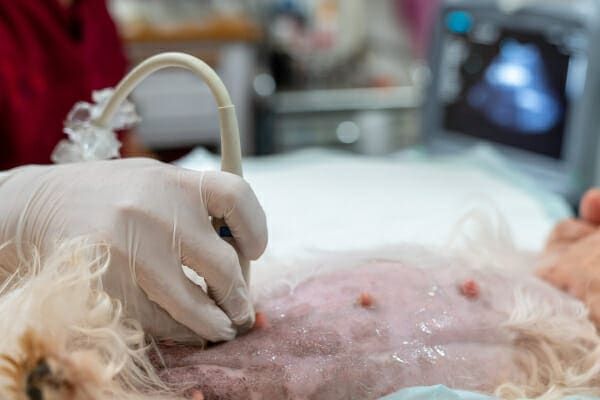
Noting thickened intestinal loops on ultrasound may be enough to presume IBD. However, that finding alone is not sufficient if the vet is using the more strict internal medicine diagnostic criteria listed above.
Endoscopy
Your vet or veterinary specialist may use a small camera to view the inside of the intestines and assess the intestinal lining. He or she may also perform endoscopically-guided intestinal biopsies at that time.
Intestinal biopsy
As mentioned, a vet can either use an endoscope or an abdominal exploratory surgery to obtain intestinal biopsies. This is a good way to confirm the presence of inflammatory cells in the lining of the intestine, which is consistent with IBD. Plus, it allows the veterinary pathologist to review the sample to further classify the IBD based on the type of inflammation.
Subtypes include lymphocytic-plasmacytic, eosinophilic, suppurative, or granulomatous IBD. These classifications are based on the type of inflammatory cells present in the intestines. This information can help the veterinarian tailor the treatment plan to your dog’s particular case.
For example, eosinophils, the predominant cells in eosinophilic IBD, are often seen in response to either allergies or parasitic infections. This helps explain why approximately 50% of dogs with eosinophilic IBD respond very well to hypoallergenic hydrolyzed protein diets alone.
What is the treatment for IBD in dogs?
When thinking about treatment, keep in mind that IBD is a chronic, lifelong condition. There is no cure for IBD. Treatment is centered around the management of clinical signs of IBD.
Once parasites, food sensitivity, infections, and other conditions are ruled out, dog IBD flare-up treatment often starts with a corticosteroid, such as prednisone for dogs. Initially, your vet will likely start your dog at a fairly high dose that will suppress the immune system. This will stop the immune system’s attack on the GI tract and the resulting inflammation.
It is so important that your veterinarian rules out other causes of inflammation before starting the prednisone. Otherwise, when prednisone suppresses the immune system, unidentified parasitic or other infections may become significantly worse. Thus, the step-by-step approach really does have value even though it may seem long and frustrating.
If your dog does not tolerate corticosteroids or the IBD doesn’t respond to the steroids, your vet may need to use other immunosuppressive medications. He or she will work with you to determine the best drug therapy, dosage, and schedule for your dog.
Long-term treatment for IBD in dogs
Once the inflammation is under control, your vet will create a plan to wean your dog off the medications (if possible) or get to the lowest effective dose. Some dogs will require life-long medications to keep IBD under control. Others may just need short-term medications when they have IBD flare-ups or diet changes.
If food hypersensitivities are contributing to the IBD, a hydrolyzed protein or novel protein diet may be all that is needed to control the IBD long-term. Since dietary fat can lead to inflammation, an easily digestible low-fat diet may also be beneficial for some dogs.
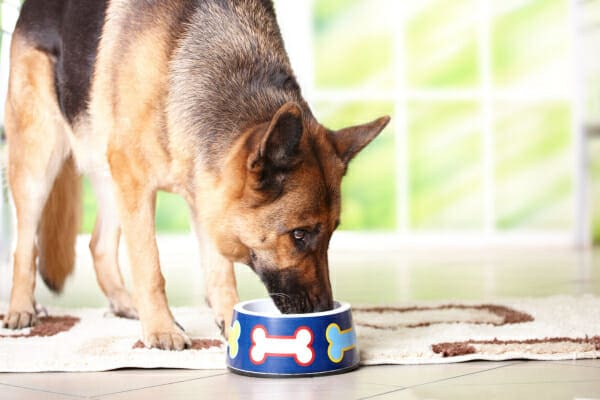
It is imperative for dogs whose IBD is controlled through a diet that they have a VERY strict adherence to their diets. Swiping a dropped morsel of food, getting into something outside, or even a small treat may be enough to cause an IBD flare-up.
Other dogs will respond favorably to treatment with an antibiotic, such as Tylosin, to adjust the bacterial populations in the GI tract. Other times vets may use a probiotic to adjust gut flora.
Some dogs may need a combination of treatments. Your vet is the best person to help come up with an individualized treatment plan for your dog and make modifications as needed.
What you can do if your dog has IBD
After the diagnosis, carefully monitor your dog’s appetite and stool quality and report any changes to your vet. This allows your vet to modify the plan or schedule a recheck appointment sooner than planned if needed. There is even a handy fecal scoring chart you can use to keep track of poop consistency.
Additionally, if your dog has any special dietary requirements, you can help your dog by strictly adhering to the plan. By substituting a romp in the yard or a cuddle session in place of any treats that were once on your dog’s menu, you can avoid an IBD flare-up.
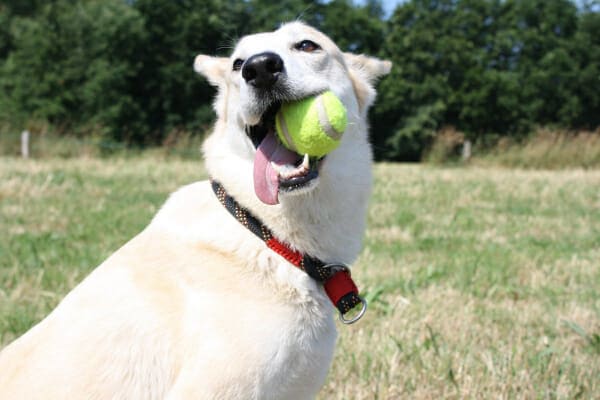
What is the prognosis for IBD in dogs?
Generally, the long-term prognosis for IBD in dogs is good. It can take some time to get a diagnosis and figure out what course of treatment works best for each individual dog, but with consistent management, dogs with IBD can have a normal life.
Canine IBD does not shorten life expectancy in most cases. These dogs may have occasional flare-ups, but the condition is usually not life-threatening.
Like with most diseases, however, IBD has a range of severity. In a small number of cases, dogs do not respond well to treatment or stop responding to the treatment they had been managed on. For some dogs, the side effects of the medications necessitate changing or discontinuing treatment.
The end stages of IBD in dogs can cause severe dehydration and weight loss. It is in these dogs that we may see fluid build-up and potentially difficulty breathing. They often stop eating, or can’t keep anything down when they do eat. In these rare instances, if treatment is unsuccessful, we must consider the quality of life and make some tough decisions.
IBD or cancer in dogs?
Up to this point, we have been talking about IBD. However, it’s also important to briefly discuss a type of cancer called gastrointestinal (GI) lymphoma, since they may be two sides of the same coin.
Unfortunately, it seems that dogs with IBD have a higher risk of developing GI lymphoma. There are two schools of thought on this correlation.
Some veterinarians think that chronic IBD predisposes a dog to GI lymphoma. Since chronic inflammation changes the cells in the GI tract, they may become neoplastic (i.e. cancerous) with time.
The other school of thought is that there is a spectrum of lymphocytic (i.e. driven by lymphocytes—a type of white blood cell) inflammation in the GI tract. Mild IBD is at one end of the spectrum and GI lymphoma is at the other end. In other words, GI lymphoma is actually the most severe form of lymphocytic-plasmacytic inflammatory bowel disease. This is an area that is still being studied.
How do you differentiate IBD from GI lymphoma in dogs?
IBD and GI lymphoma can be very similar. They both may cause the same symptoms and a dog may initially have IBD that progresses to GI lymphoma. Some dogs with GI lymphoma will have a discrete mass that your vet will be able to detect on ultrasound or X-rays. Others will show diffuse thickening of the intestines, much like that seen in patients with IBD.
This is where an intestinal biopsy can be very useful. In most cases, a trained veterinary pathologist will be able to use special stains and his or her expertise to distinguish between IBD and GI lymphoma, although sometimes it can be a bit tricky.
What is the treatment for GI lymphoma in dogs?
Just like lymph node (multicentric) lymphoma in dogs, GI lymphoma may respond to chemotherapy or other medications, like steroids. Generally, using chemotherapy to treat lymphoma gives the best outcome. If there is a discrete mass, sometimes it can be surgically removed.

Help and hope for dogs with IBD
If you suspect your dog could have IBD, the road ahead may seem daunting. I understand how hard it is to watch your dog continue to have diarrhea and feel like you’re not getting any answers or resolution.
However, a step-by-step approach is so important to ensure that your vet reaches the correct diagnosis. Hang in there and remember that every step you take is, hopefully, one step closer to having an answer that will help your dear dog.
And if you receive that diagnosis of IBD, don’t despair! Keep working with your vet to develop the best management strategy for your dog. There is hope for him or her to live a long, happy life!

Do you have a dog with IBD?
Please share his or her story below.


I wish I’d been able to read this article when my dog developed IBD. He passed away from it after being “treated” by his vet with several rounds of various antibiotics, all with no success. By the time the vet referred us to a specialist in internal medicine, it was too late. After the specialist did some tests, gave him 2 blood transfusions that did not help, since by that time, he was very anemic, the next step was an endoscopy. By the time that was attempted, the lining of his intestines had literally started peeling off. So no biopsy was done. The specialist had one more “medication” she wanted to try for a week before giving up. but after 2 days on that medication, I knew he was in a lot of pain, and I felt he had suffered enough. I made the decision to end his suffering. My advice to anyone with a dog exhibiting IBD symptoms is get to a specialist in internal medicine immediately. IMO a lot of regular vets do not know enough about IBD to properly diagnose or treat it and wait too long to refer to a specialist
. To this day, I carry the guilt of waiting too long. My dog died years too soon after suffering for way too long.
Dear Gretchen,
I am sorry for the tragic loss of your beloved boy. I understand your grief but please don’t let guilt weigh heavily on you. You did everything you could to help him. Please try to allow yourself some grace. Thank you for being willing to share your story with us as this may be exactly what another reader needs to hear. With time I hope your heart can begin to heal and you can find peace. May his memory stay with you always. ♥
My dog is only 4 and was diagnosed with IBD after I all but stood up and screamed that there was an issue with my boy- now he is on hydrolyzed protein and some lamb with sulcrafate and omeprazole twice daily- at least once daily twice whr he needs it and cerenia as needed. He is also getting probiotics- he just seems to still have days he is “urping” gulping and burping like I do with GERD- any other advice?
Hi Teresa,
I am sorry your young dog is living with IBD. He is very lucky to have you advocating for his health and well-being. From what you mentioned, you are already doing everything I would normally recommend and then some. If you would like an expert opinion, you can always ask your vet about a consultation with a veterinary internal medicine specialist. Wishing you and your sweet boy continued success. You are doing a great job. Keep up the good work!
I hope you can give me some advice. I am in South Africa and I have a 12- and 1/2-year-old Rhodesian Ridgeback female. I changed to a Vet closer to me because I thought that her time was coming. Not doing well, after she was diagnosed with a heart murmur on August 23. I went to see Vet because she was scrapping her throat and coughing. On heart medication Fortekor.
As she did not do well, I went to visit another Vet closer to me because I found that she was no doing well and perhaps time would come soon for her. June 24.This Vet checked her heart and said that there was no problem there…….we, more me then him, came to the conclusion that she might have GOLPP. She also had rear end weakness. This Vet, I think, had no experiences with this disease, his diagnose was more towards osteoarthritis. He advice the Prescription Hill’s Mobily food. I did not agree and after reading your article about Golpp I was convinced that she had this disease. All symptoms were there. I asked for Doxepin but this is not available in SA.
The food did not improve anything and the panting and scraping throat got worse. He put her on Inflacam.
I time in those months she had AP and I asked for antibiotics. Amoclan. ( Sept.)
6 Oct, she got bad diarrhea, Vet gave her antibiotics Amoclan again.
16 Oct I took her to Vet because she was not getting better and her defecating was painful and looked like yellow soup! I thought she might had swallowed a bone, what was not supposed to happen but the marrow broke……
I had X rays made but there was nothing to see to indicate that there was an obstruction Also a blood test done and only the Liver enzymes were a bit high.
Antibiotics again Metronidazole for 10 days.
Until today her diarrhea has not cleared…..
I started again with a diet of only chicken and rice. Perhaps she should get an antibiotic again but perhaps you can advice!
I am so sorry for his whole long story; I am at my wit’s end.
I was planning to go to a known clinic, but it is a 1 and half hour drive and she cannot be in the car that long. She panics and pants terrible. She will not make a long drive in the car.
Hope you can find time to read my story and can offer some advice.
Thank you so much!
Regards
Dinja
Hi Dinja,
My heart goes out to you as you face this difficult situation with your senior girl. I can only imagine how frustrating it must be to still have more questions than answers despite all the testing and treatment you have done. I wish I had some great advice, but unfortunately without playing a personal role in your dog’s medical care, it is hard to offer specific conclusions and recommendations. I am not sure how the coughing relates to the GI issues, but laryngeal paralysis is definitely a possibility. I am a bit suspicious that maybe the antibiotics have caused a bacterial imbalance in your dog’s gut (just like how people can get diarrhea from taking antibiotics). It may be a good idea to try a probiotic and see if improving gut health decreases the severity of her symptoms. Coughing and gagging can also be a sign of worsening heart disease (congestive heart failure). I know you mentioned a vet said there was no problem with the heart, but it might be worth getting a second opinion just to err on the side of caution. It is clear your girl is dearly loved, and you will do anything to try and get her the help she needs. Don’t give up hope! Praying for answers and a clear path forward. Wishing you and your pup many happy days ahead. ♥
Our 13 year old Chihuahua mix was diagnosed with IBD in June. She was doing well on hypoallergenic food and medication that managed her condition until a month ago when she had a flare up and had almost constant diarrhea. Last weekend, she began vomiting as well. She was unable to keep anything down and had become lethargic, so we rushed her to the vet and she has been warded ever since. She was put on a continual, but gradual, NaCl drip, calcium supplements, Budesonide and Neoral, as well as her other medications. (She had very low protein /albumin levels, as well as low calcium when she was first brought in. The calcium has helped and she has stopped vomiting.)
Our poor girl, who’s usually very food motivated, has no appetite 🙁 Her limbs are swollen from the drip and still has diarrhea 🙁
If the Neoral doesn’t work, we’re not sure what her or our other options are 🙁
Dear Mariel,
Goodness, I am so sorry your senior girl is dealing with such severe issues. It sounds like the veterinary team is doing all they can to give her the best chance at recovery. Praying for a miracle and that your pup will keep fighting. Wishing you strength and comfort as you navigate this unknown path.
I have found that daily prednisolone is very helpful in such instances, along with a short course of metronidazole for her diarrhea. I have also used Proviable paste and/or psyllium husks (with no other additives in it) to control diarrhea. It is important to get her a food that does not contain animal protein as most IBD is caused by Animal Protein ingestion. If she is not drinking well or diarrhea is constant, I have also given subcutaneous Ringers Lactate daily to keep her hydrated.
Hi Margaret,
Thanks for offering these great suggestions and sharing your experience with us. Best wishes to you and yours!
This is so similar to our sweet girl who just got out of hospital! Her GI issues were triggered by anesthesia from a biopsy, which turned out to be chodrosarcoma in her outer rib cage. Ironically, the cancer is very treatable but the nearly two weeks of hypo/anorexia was brutal! Happy to report that they were able to keep her stable on plasma to get her serum proteins up. She eventually regained appetite on anti-nausea and anti-pain meds, which were our only options before knowing what oncology care was indicated (you can’t do steroids before certain treatments).
She’s always had a sensitive tummy, but we think the special care we took on her diet kept her GI very robust. Our girl LOVES veggies and fruit. In excess and raw, this fiber can be upsetting for a dog’s gut because it’s a bit shorter than ours, hence less digestion and breakdown time, plus they have fewer of the enzymes required to break down dietary starches. Over the years, though, we’ve found quite generous portions of things like raw carrots, green beans and watermelon were EXTREMELY well tolerated by her gut and even seemed to help her. I’ve read that sometimes with IBD, extra bulk from fiber can actually help support healthy BMs depending on the state of the individual dog’s GI and microbiome.
That said: right now we are sticking to mixing in high gelatin bone broth and boiled chicken into a gut biome supporting wet food. Any veggies she’s getting right now are cooked. I’m also pureeing some of her food in a blender to ease digestion! I hope you can get your pup on a good footing, but we’ve had great success with chicken foot broth, pumpkin and yam purées, and blended oat meal as mix ins to heal her intestinal lining and get her back on track. She’s still on two different anti nausea meds and is getting Prilosec at night to stave off nighttime regurgitation. Doctors told us she likely wasn’t vomiting but was experiencing very bad GERD and regurgitation after going to sleep.
Happy to report she is back to formed poops right after discharge!
In terms of food allergies, I’m no expert, but I tend to look at the quality of ingredients. I actually farm a bit, and some of the more industrialized meat products can have a lot more going on than just meat… worth considering!
Hi Alyssa,
I am glad your girl has improved, and you found what works best for her. Thank you for sharing your experience and offering these great suggestions. Wishing your sweet girl continued success and many happy years ahead!
This is one of the best pages I’ve found on IBD. Thank you. My dog has been on prednisolone for about a year. She’s doing fairly well except she drives me crazy with excessive drinking, searching for crumbs, agitation, and peeing in the house. Are there alternative care options like cooking for her or a different medication that I should explore? I have a pretty traditional vet. I’d love to see an alternative vet but I don’t know if it’s a good option to explore. What are your thoughts?
Hi Colette,
I understand your concern for your pup and the side effects she is experiencing while taking prednisolone. I think it is great you are reaching out for advice and working so hard to advocate for her health and well-being. Rarely is there only one way to treat a disease. While I am not sure what options are available that would fit your girl’s specific medical needs, I do think it could be good to reach out to a specialist. There are veterinarians that specialize in internal medicine, and they would know if there were other medications that could be of benefit to your girl. Here is a link to an article that can help you find specialty vets in your area (alternative and holistic vets too!): How Do I Find Veterinary Specialists Near Me and What Do They Do?
Hoping you can find the answers you need to ensure your girl remains happy and healthy for many years to come.
Hi there,
Our 14 year old otherwise-healthy greyhound has very recently been diagnosed with IBD and our vet has recommended the “COMPLETE & BALANCED dog cookbook by Hilary Watson”. I had a look at a copy in my vet’s waiting room and it looked pretty sensible. There are lots of books out there of course.
Fingers crossed.
It has taken 3 years to get Henry my chihuahua aprox 11 yrs old diagnosed. I was told he had a back problem twice and I just knew that was wrong. After repeated flair ups pancreatitis was suspected. .But, while it seemed plausible it still didn’t feel right. although we saw a change with food management we never knew how or when it would happen. This current bout has been going on for over a month. It now seems to be on its way out. I refused to give up, I knew something was wrong, Henry was alive but far from thriving. I finally found a great vet who did a lot of testing and an ultra sound. No pancreatitis but, IBD was suggested. It covers all his symptoms and He is now on RX food . He is recovering 🙂 I wonder if because he had a bladder infection that caused his immune system to be inflamed which maybe started this flair up? I am very happy with how far Henry has come. He has lost 2 lbs and is not depressed & not sleeping all day anymore. I think he misses cheese though 😉
Hi Scheryl,
Great job continuing to advocate for Henry! I’m so thankful that you have gotten to the root of his issues and that he is finally starting to feel better. I hope that he continues to improve and doesn’t have a flare-up for a long time.
I gave a question about my dog that I had put to sleep back in 2016. At the time I was so devaststated and couldn’t remember what happened at that time. I called the ER vet and the e mailed me the paper work. Would it be possible to send it to you to see what you thought could have happened? Thank you, Melinda Selander
Dear Melinda,
I am so sorry for the loss of your dog. I can only imagine how difficult it must be to have more questions than answers. Unfortunately, without having personally examined your dog or being directly involved with the case, I am not sure I would be able to make a diagnosis just from notes and data. The best way to find out what happened would be to talk to the vet that handled the ER duties that day. I wish I had more helpful advice. Praying for comfort and peace for your heart.